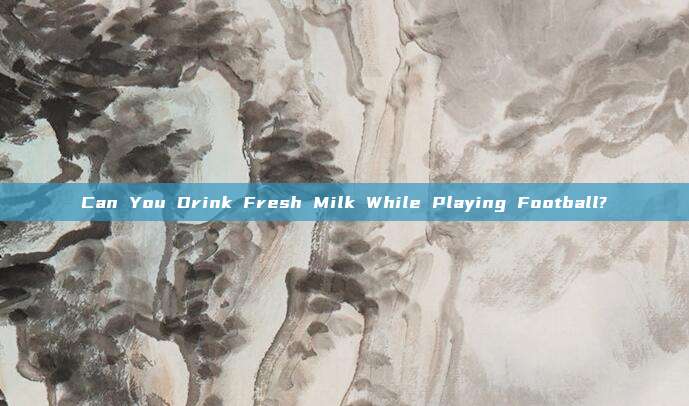### Can You Drink Fresh Milk While Playing Football?

In the vast tapestry of sports and nutrition, questions abound about what athletes can and cannot do to optimize their performance. One such query that has sparked lively debates among players, coaches, and fans alike is: "Can you drink fresh milk while playing football?" At first glance, this might seem like a straightforward question, but delving deeper reveals a complex interplay of factors that influence athletic performance and hydration strategies.
#### The Basics of Hydration
Before diving into the specifics of drinking fresh milk during a football match, it's essential to understand the importance of hydration in sports. Water plays a crucial role in maintaining optimal body temperature, facilitating nutrient transport, and ensuring that all bodily functions operate efficiently. Dehydration, on the other hand, can lead to reduced endurance, impaired coordination, and increased risk of injury.
#### The Case for Fresh Milk
Fresh milk, often touted for its rich nutritional content, including proteins, vitamins, and minerals, presents an interesting case when considered as a potential beverage option during physical activity. Advocates of drinking milk during football matches argue that its unique blend of nutrients can provide a quick energy boost and aid in muscle recovery.

**Energy Boost:** Milk contains carbohydrates, which are a primary source of energy for the body. During intense physical activities like football, these carbohydrates can help sustain energy levels and delay fatigue.
**Muscle Recovery:** Protein is essential for repairing and rebuilding muscles after exercise. Drinking milk, which is a good source of protein, immediately after a game or during halftime can support muscle recovery, potentially reducing soreness and improving performance in subsequent matches.
#### The Counterarguments
While the benefits of fresh milk are compelling, there are also valid concerns that have led some to question its suitability as a mid-game beverage.
**Digestive Discomfort:** Milk, particularly when consumed in large quantities, can cause digestive discomfort in some individuals. This discomfort includes bloating, cramping, and diarrhea, which can be detrimental to performance.
**Lactose Intolerance:** A significant portion of the population is lactose intolerant, meaning they lack sufficient lactase—the enzyme needed to digest lactose, a sugar found in milk. Consuming milk can lead to gastrointestinal symptoms, making it unsuitable for these individuals during physical exertion.

**Hydration Efficiency:** Water is universally recognized as the most efficient hydrator. While milk does contain water, its high fat and protein content means it is less effective at rehydrating the body compared to pure water. This can be particularly problematic in hot and humid conditions where rapid rehydration is crucial.
#### Scientific Perspectives
To shed light on the debate, several studies have explored the effects of drinking milk versus water during physical activity. One study found that consuming milk post-exercise resulted in greater improvements in muscle protein synthesis compared to water, suggesting that milk may be beneficial for recovery. However, another study noted that milk consumption during exercise led to increased gastrointestinal discomfort, highlighting the need for individualized approaches.
#### Practical Considerations
For those considering incorporating milk into their pre- or mid-game routine, there are practical steps to consider:
1. **Trial Runs:** Experiment with small amounts of milk during training sessions to assess how your body responds.
2. **Individual Tolerance:** Pay attention to any signs of discomfort or digestive issues. If you experience negative symptoms, it may be best to stick with water or a sports drink.
3. **Timing:** Drinking milk too close to the start of a game or during halftime might not be ideal due to the time required for digestion. Consider timing your consumption accordingly.
#### Conclusion
The question of whether one can drink fresh milk while playing football does not have a one-size-fits-all answer. Factors such as individual tolerance, specific nutritional needs, and the intensity of the game play significant roles in determining the appropriateness of this beverage choice. For many athletes, a balanced approach that includes both water and milk (or other suitable beverages) tailored to their specific requirements might be the most effective strategy. Ultimately, the goal should always be to support optimal performance and well-being on and off the field.
In the world of sports, where every advantage counts, understanding the nuances of nutrition and hydration can make all the difference. Whether you choose to sip milk or stick with water, the key lies in finding the right balance that works for you.





